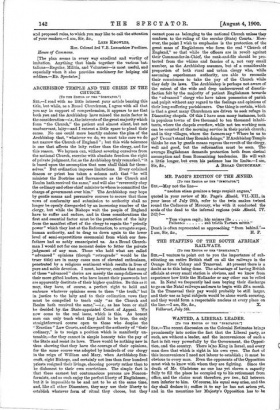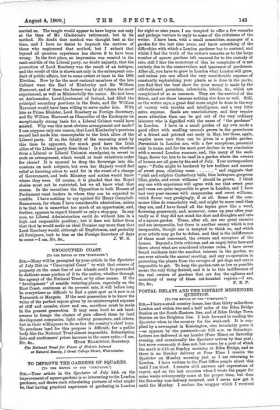WANTED, A LIBERAL LEADER.
[To THE EDITOR OF THE "SPECTATOR."] SIR,—The recent discussion on the Colonial Estimates brings prominently into notice the fact that the Liberal party, as such, are without a leader, and the inconvenience of such a fact is felt very powerfully by the Government, the Opposi- tion, and the country. There is:no King in Israel, and every man does that which is right in his own eyes. The fact of this inconvenience I need not labour to establish ; it must be obvious to every man. Even the opponents of the Opposition must wish to know with whom they are fighting. Since the death of Mr. Gladstone no one has yet shown a capacity fully to fill the place he occupied up to his retirement from office, and the choice must therefore, pro tem., fall between men inferior to him. Of course, his equal may arise, and the day shall declare it; suffice it to say he has not arisen yet, and in the meantime her Majesty's Opposition has to -be carried on. The tangle would appear to have begun not only at the time of Mr. Gladstone's retirement, but in its method. No doubt that method was thought best at the time, and I have no desire to impeach the motives of those who engineered that method, but I submit that beyond all question experience has shown it to have been wrong. In the first place, an impression was created in the rank-and-file of the Liberal party, no doubt unjustly, that the promotion of Lord Rosebery was the result of an intrigue, and the result of this is shown not only in the subsequent con- duct of public affairs, but to some extent at least in the 1895 Election. Now by far the most eminent members of the late Cabinet were the Earl of Kimberley and Sir William Harcourt, and of these the former was by all tokens the most experienced, as well as Ministerially the senior. He had been an Ambassador, Lord-Lieutenant of Ireland, had filled the principal secondary positions in the State, and Sir William Harcourt would have been willing to serve under him. With him as Prime Minister, Lord Rosebery as Foreign Secretary, and Sir William Harcourt as Chancellor of the Exchequer an exceptionally strong basis for a Liberal Cabinet would have existed. Why was this most obvious arrangement not made P I can suppose only one reason, that Lord Kimberley's previous record had made him unacceptable to the Irish allies of the Liberal party. If so, the fatuity of the reasoning must by this time be apparent, for much good have the Irish allies of the Liberal party done them ! Is it too late, whether from a Liberal or Liberal Unionist standpoint, to revert to such an arrangement, which would at least substitute order for chaos ? It is unusual to drag the Sovereign into dis- cussions on such subjects, but even her Majesty would feel relief at knowing whom to send for in the event of a change of Government, and both Ministry and nation would know where they were. Of course, it is pleaded that the Royal choice must not be restricted, but we all know what that means. In the meantime the Opposition in both Houses of Parliament want leaders in whom they can be expected to confide. I have nothing to say against Sir Henry Campbell- Bannerman, for whom I have considerable admiration, unless it be that he is somewhat too much of an opportunist, and, further, appears to regard himself as only a stop-gap. In any case, no Liberal Administration could do without him in a high and responsible position ; but it does not follow from that that he would make an ideal Premier any more than that Lord Rosebery would, although all Englishmen, and probably all foreigners, look to him as the Foreign Secretary of days



































 Previous page
Previous page